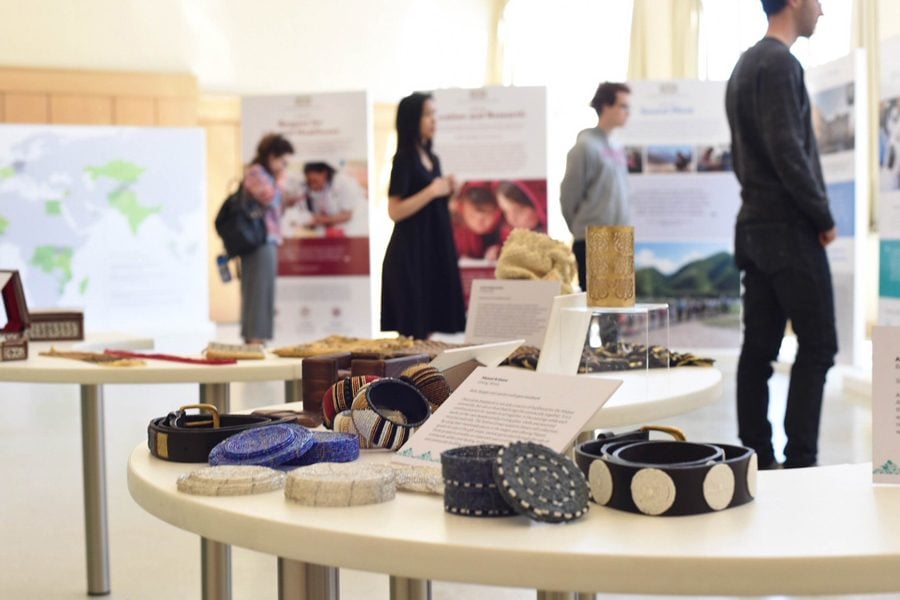Exhibit showcases humanitarian work of organization founded by Ismaili Imam
(Colin Boyle/Daily Senior Staffer
Cultural artifacts created by communities served by the Aga Khan Development Network. An exhibit featuring the humanitarian work of the aid organization was displayed in Parkes Hall on Monday.
May 7, 2018
An exhibit featuring the humanitarian work of the Shia Imami Ismaili Muslims highlighted the community’s expansive reach throughout the world.
The exhibit, hosted by the Center for Civic Engagement in Parkes Hall on Monday, showcased the contributions to developing countries made by the Aga Khan Development Network, an aid organization founded by the Ismaili Imam, His Highness the Aga Khan.
Titled “Ethics in Action,” the display, which will remain open through Tuesday, illustrates the principles that guide AKDN’s engagement — self-reliance and human dignity, sustainable environment, education, respect for health and sound of mind among them, Nafees Rahman, communications coordinator for the Ismaili Council for the Midwest, told The Daily in an email.
Islamic values lay the foundation for these ethics, Rahman said, adding that the Aga Khan views one of his responsibilities as improving the “quality of life of his community, as well as those among whom they live.”
“This exhibit draws attention to the dire conditions that still exist in much of the world, and the positive changes that AKDN and its partners are implementing,” he said. “Knowledge and information is critical if we want to understand the issues facing much of the developing world, and this exhibit depicts what is being done to improve people’s lives.”
AKDN is a network of secular organizations originally established to improve the quality of life of Ismaili communities. Today, its philanthropy serves people regardless of race, religion, ethnicity or gender in the name of pluralism, Rahman said, and focuses primarily on underdeveloped countries in Asia and Africa.
The collection of nonprofits has also made its way to the United States, where it has recruited global volunteers and formed public-private relationships to aid impoverished communities. “Agreements of Cooperation” were signed with governors from California, Texas and Illinois to maximize resource allocation and facilitate relationships with those state governments.
Heidi Gross, assistant director for the Center for Civic Engagement, said the exhibit featuring a community not known to many Northwestern students is an opportunity to for them to gain a new perspective — one of the center’s goals.
“I hope that college can be a time of students broadening their horizons, learning about people and communities and cultures that are different than their own,” she said. “That just helps make us all well-rounded citizens.”
However, there are also students, faculty and staff who are members of the Ismaili community, Gross said. For them, she said, it’s a chance to hear more about their culture and background among peers.
Weinberg freshman Anusha Ebrahim is among those members. The exhibit traveled from Glenview, home to her local Ismaili center, to NU as part of a nationwide tour, she said.
Ebrahim said it was interesting that it came to NU because AKDN’s work is not typically known to the general public.
“They really highlighted some of the important things that the Imam has been doing,” she said. “It makes me very proud to be a part of this community and part of this bigger thing.”
Email: [email protected]
Twitter: @_perezalan_


